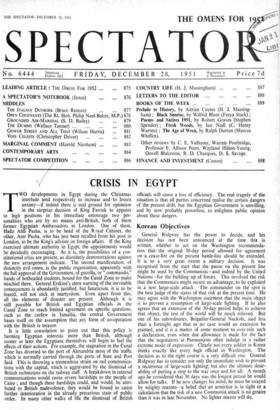CRISIS IN EGYPT
TWO developments in Egypt during the Christmas interlude tend respectively to increase and/to lessen anxiety—if indeed there is real ground for optimism in the surprise decision of King Farouk to appoint to high positions in his immediate entourage two pei- sonalities who are by no means anti-British, both of them former Egyptian Ambassadors in London. One of them, Hafiz Afifi Pasha, is to be head of the Royal Cabinet, the other, Amr Pasha, who has just been recalled from his post in London, to be the King's adviser on foreign affairs. If the King exercised ultimate authority in Egypt, the appointments would be decidedly encouraging. As it is, the possibilities of a con- stitutional crisis are present, as disorderly demonstrations against the new arrangement indicate. The second manifestation, of distinctly evil omen, is the public organisation, apparently with the full approval of the Government, of guerilla, or "commando," bands of hotheaded students, bound for the Canal Zone to make mischief there. General Erskine's stern warning of the inevitable consequences is abundantly justified, but fanaticism, it is to be feared, will not stick at martyrdom. Even apart from this, all the elements of disaster are present. Although it is still possible for British and Egyptian officials in the Canal Zone to reach limited agreement on specific questions, such as the curfew in Ismailia, the central Government bases itself on the assumption that any form of co-operation with the British is treason. It is little consolation to point out that this policy is harming Egyptian interests more than British, although sooner or later the Egyptians themselves will begin to feel the effects of their actions. For example, the stagnation in the Canal Zone has diverted to the port of Alexandria most of the traffic which is normally carried through the ports of Suez and Port Said. This is throwing a tremendous strain on rail communica- tions with the capital, which is aggravated by the dismissal of British technicians on the railway staff. A breakdown in internal communications would cause severe hardships to_the people of Cairo ; and though these hardships could, and would, be attri- buted to British malevolence, they would be bound to cause further deterioration in the already precarious state of public order. In many other walks of life the dismissal of British officials will cause a loss of efficiency. The real tragedy of the situation is that all parties concerned realise the certain dangers of the present drift, but the Egyptian Government is unwillmg, and by now probably powerless, to enlighten public opinion about these dangers.






























